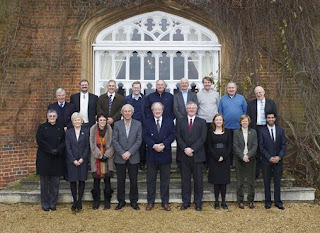My university is in danger of losing direction. So how is power exercised in it? The College exists, according to its 1985 charter, ‘to promote for the public benefit education and scholarship’ and ‘to provide instruction leading to the degrees of the University, to superintend postgraduate studies and to promote research’.
The only people with the power to take major decisions to make sure that these objectives are met are the members of the college Council. There are currently fifteen lay members of council, whose votes alone determine the future of the college. They can vote for or against proposals put to them by the Principal. They appoint him. He is accountable to them. They are our executive body. They could not be more important.
Royal Holloway Council
There is absolutely no statute or rule preventing any member of college from contacting them. But when our campaign asked for their addresses so that we send invitations to them to attend our event Celebrating Classics at Royal Holloway on 16th September, the college administration refused to let us have them, saying they would forward the envelopes on themselves.
Just in case this did not happen, we persevered and managed to track down most of the addresses, even though the list on the official college website was out-of-date. One Councillor, Hugh Meares, accepted. He has been extremely helpful and interested in hearing our case.
In anticipation of the Council meeting scheduled for the 5th of October, we wrote to all the Councillors again. When they arrived on campus, they were greeted by a large and good-humoured group of protesting staff and students. Before and during the Council meeting, several of them said publicly--and were even filmed saying--that they were surprised and impressed to have been contacted by us.
Thankfully they deferred all decisions about the proposed ‘restructuring’ of academic departments, which of course involve the radical reduction in the size and autonomy of Classics & Philosophy as well as redundancies for several of my colleagues.
There was, indeed, a lengthy discussion in which, most unusually, the Senior Management Team was criticised by some of the Lay Councillors for its handling of the whole process and the ‘consultation’ period.
What lessons can we learn from this? The staff and students of my university need to be in direct dialogue with those who hold the executive power in our institution. These people are reasonable, experienced, civil, highly intelligent, interested in us and what we do, and can be persuaded by rational arguments if we can just get direct access to them.
School governors are normally expected to spend a day or two a year in schools, attending classes and meeting pupils and staff. But our own Councillors at Royal Holloway scarcely know who we are. This probably applies to universities and colleges across the country.
We can’t let the new Professional Managers who are taking over our institutions stop us talking to our Councillors. We need to take up every opportunity to explain our work as students and staff of the college both in the run-up to the next Council Meeting, on 21st November, and into the future.
There is NO requirement for secrecy or silence, merely a corrosive convention that has slowly taken hold and can be exploited by those whom it suits. Let’s think about ways of talking directly to the Councillors NOW!

Would the College council members be willing to introduce themselves and indicate if and how they can be contacted by alumni of the College? They might like to use 'Higher', the magazine for alumni of Royal Holloway and Bedford. I was at Bedford in 1964.
ReplyDeleteVirginia,
ReplyDeleteI quite agree that something like this is required. Perhaps you should write to the Principal, or to the Higher, or to the Council members via the college, in order to suggest it.